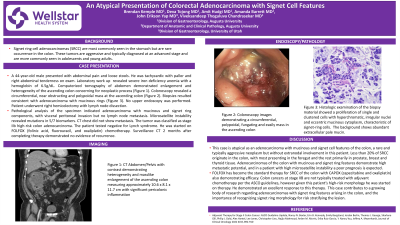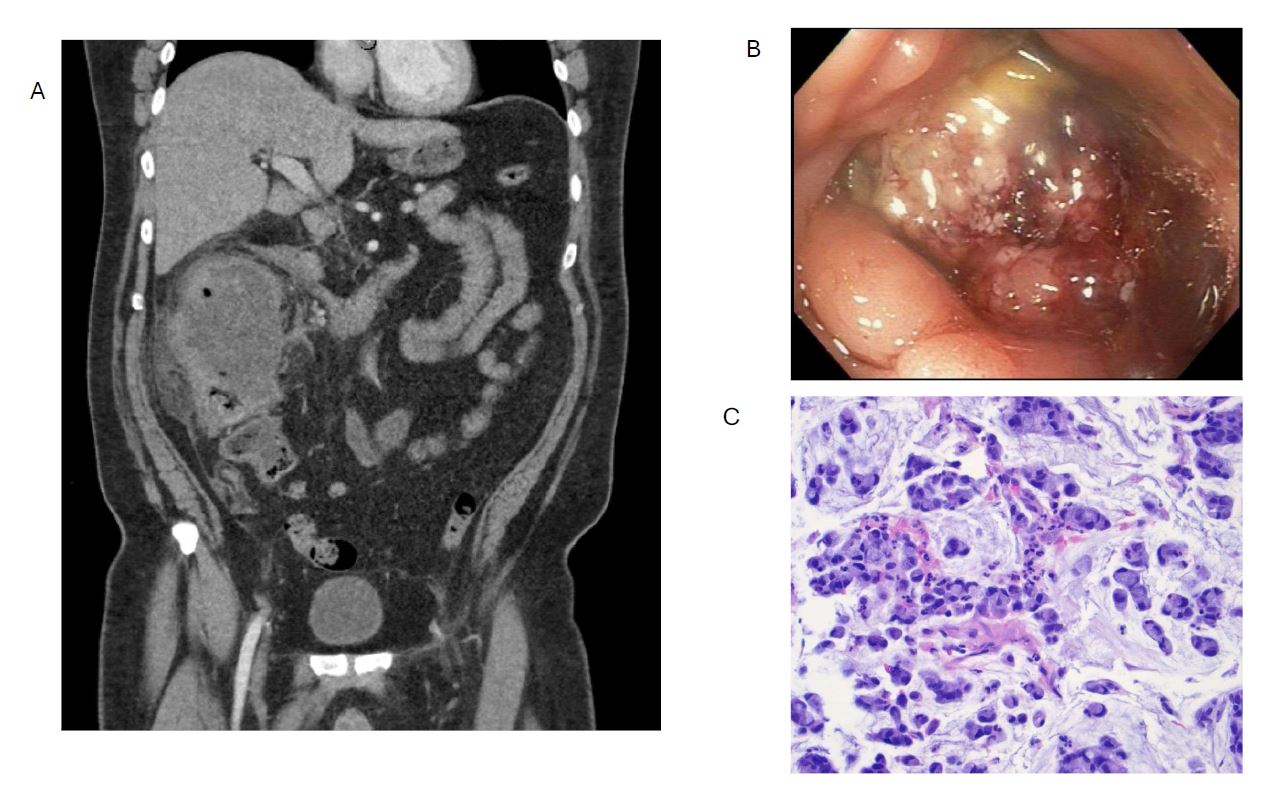Tuesday Poster Session
Category: Colon
P3808 - An Atypical Presentation of Colorectal Adenocarcinoma With Signet Cell Features
Tuesday, October 29, 2024
10:30 AM - 4:00 PM ET
Location: Exhibit Hall E

Has Audio

Brendan Kemple, MD
Augusta University
Graniteville, SC
Presenting Author(s)
Brendan Kemple, MD1, Deva Christine T. Tojong, MD2, Amit Hudgi, MD2, Amanda Barrett, MD3, John Erikson Yap, MD, MBA, FACG4, Viveksandeep Thoguluva Chandrasekar, MBBS2
1Augusta University, Graniteville, SC; 2Medical College of Georgia at Augusta University, Augusta, GA; 3Augusta University, Augusta, GA; 4Metrodora Institute, West Valley City, UT
Introduction: Signet ring cell adenocarcinomas (SRCC) are commonly seen in the stomach but are rare occurrence in the colon. These tumors are aggressive and typically diagnosed at an advanced stage. Here we present an interesting case of adenocarcinoma with mucinous and signet ring features found in the ascending colon.
Case Description/Methods: A 44-year-old male presented with abdominal pain and loose stools. He was tachycardic with pallor and right abdominal tenderness on exam. Laboratory work up revealed severe iron deficiency anemia with a hemoglobin of 6.5g/dL. Computerized tomography (CT) of abdomen demonstrated enlargement and heterogeneity of the ascending colon concerning for neoplasm (Figure 1A). Colonoscopy revealed a circumferential, near obstructing and polypoidal mass at the ascending colon (Figure 1B). Biopsies resulted consistent with adenocarcinoma with mucinous rings (Figure 1C). No upper endoscopy was performed. Patient underwent right hemicolectomy with lymph node dissection.
Pathological analysis of the specimen indicated adenocarcinoma with mucinous and signet ring components, with visceral peritoneal invasion but no lymph node metastasis. Microsatellite instability revealed mutations in 5/7 biomarkers. CT chest did not show metastasis. The tumor was classified as stage IIb high-risk colon adenocarcinoma. The patient tested negative for Lynch syndrome. He is currently on cycle 7 of FOLFOX (folinic acid, fluorouracil, and oxaliplatin) chemotherapy.
Discussion: This case is atypical as an adenocarcinoma with mucinous and signet cell features of the colon, a rare and typically aggressive neoplasm but without extranodal involvement in this patient. Less than 20% of SRCC originate in the colon, with most presenting in the foregut and the rest primarily in prostate, breast and thyroid tissue. Adenocarcinomas of the colon with mucinous and signet ring features demonstrate high metastatic potential, and in a patient with high microsatellite instability a poor prognosis is expected.
FOLFOX has become the standard therapy for SRCC of the colon with CAPOX (capecitabine and oxaliplatin) also demonstrating efficacy. Colon cancers at stage IIB are not typically treated with adjuvant chemotherapy per the ASCO guidelines, however given this patient’s high-risk morphology he was started on therapy. This case contributes to a growing body of research regarding adenocarcinomas with signet ring features arising in the colon, and the importance of recognizing signet ring morphology for risk stratification.

Disclosures:
Brendan Kemple, MD1, Deva Christine T. Tojong, MD2, Amit Hudgi, MD2, Amanda Barrett, MD3, John Erikson Yap, MD, MBA, FACG4, Viveksandeep Thoguluva Chandrasekar, MBBS2. P3808 - An Atypical Presentation of Colorectal Adenocarcinoma With Signet Cell Features, ACG 2024 Annual Scientific Meeting Abstracts. Philadelphia, PA: American College of Gastroenterology.
1Augusta University, Graniteville, SC; 2Medical College of Georgia at Augusta University, Augusta, GA; 3Augusta University, Augusta, GA; 4Metrodora Institute, West Valley City, UT
Introduction: Signet ring cell adenocarcinomas (SRCC) are commonly seen in the stomach but are rare occurrence in the colon. These tumors are aggressive and typically diagnosed at an advanced stage. Here we present an interesting case of adenocarcinoma with mucinous and signet ring features found in the ascending colon.
Case Description/Methods: A 44-year-old male presented with abdominal pain and loose stools. He was tachycardic with pallor and right abdominal tenderness on exam. Laboratory work up revealed severe iron deficiency anemia with a hemoglobin of 6.5g/dL. Computerized tomography (CT) of abdomen demonstrated enlargement and heterogeneity of the ascending colon concerning for neoplasm (Figure 1A). Colonoscopy revealed a circumferential, near obstructing and polypoidal mass at the ascending colon (Figure 1B). Biopsies resulted consistent with adenocarcinoma with mucinous rings (Figure 1C). No upper endoscopy was performed. Patient underwent right hemicolectomy with lymph node dissection.
Pathological analysis of the specimen indicated adenocarcinoma with mucinous and signet ring components, with visceral peritoneal invasion but no lymph node metastasis. Microsatellite instability revealed mutations in 5/7 biomarkers. CT chest did not show metastasis. The tumor was classified as stage IIb high-risk colon adenocarcinoma. The patient tested negative for Lynch syndrome. He is currently on cycle 7 of FOLFOX (folinic acid, fluorouracil, and oxaliplatin) chemotherapy.
Discussion: This case is atypical as an adenocarcinoma with mucinous and signet cell features of the colon, a rare and typically aggressive neoplasm but without extranodal involvement in this patient. Less than 20% of SRCC originate in the colon, with most presenting in the foregut and the rest primarily in prostate, breast and thyroid tissue. Adenocarcinomas of the colon with mucinous and signet ring features demonstrate high metastatic potential, and in a patient with high microsatellite instability a poor prognosis is expected.
FOLFOX has become the standard therapy for SRCC of the colon with CAPOX (capecitabine and oxaliplatin) also demonstrating efficacy. Colon cancers at stage IIB are not typically treated with adjuvant chemotherapy per the ASCO guidelines, however given this patient’s high-risk morphology he was started on therapy. This case contributes to a growing body of research regarding adenocarcinomas with signet ring features arising in the colon, and the importance of recognizing signet ring morphology for risk stratification.

Figure: Figure 1A: 10.6 x 8.1 x 11.7 cm heterogeneous ascending colon mass with surrounding pericolonic inflammatory changes seen on CT Abdomen/Pelvis
Figure 1B: Circumferential, friable, polypoid mass in the ascending colon seen during colonoscopy
Figure 1C: Histologic examination of the biopsy material showed a proliferation of single and clustered cells with hyperchromatic, irregular nuclei and eccentric mucinous cytoplasm, characteristic of signet-ring cells. The background shows abundant extracellular pale mucin.
Figure 1B: Circumferential, friable, polypoid mass in the ascending colon seen during colonoscopy
Figure 1C: Histologic examination of the biopsy material showed a proliferation of single and clustered cells with hyperchromatic, irregular nuclei and eccentric mucinous cytoplasm, characteristic of signet-ring cells. The background shows abundant extracellular pale mucin.
Disclosures:
Brendan Kemple indicated no relevant financial relationships.
Deva Christine Tojong indicated no relevant financial relationships.
Amit Hudgi indicated no relevant financial relationships.
Amanda Barrett indicated no relevant financial relationships.
John Erikson Yap indicated no relevant financial relationships.
Viveksandeep Thoguluva Chandrasekar indicated no relevant financial relationships.
Brendan Kemple, MD1, Deva Christine T. Tojong, MD2, Amit Hudgi, MD2, Amanda Barrett, MD3, John Erikson Yap, MD, MBA, FACG4, Viveksandeep Thoguluva Chandrasekar, MBBS2. P3808 - An Atypical Presentation of Colorectal Adenocarcinoma With Signet Cell Features, ACG 2024 Annual Scientific Meeting Abstracts. Philadelphia, PA: American College of Gastroenterology.
